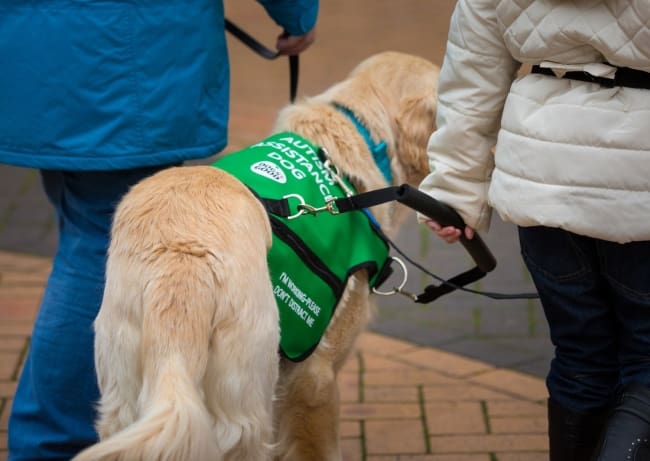We know what it’s like… you love dogs and when you see one while you’re out and about, your natural reaction is to bend down, say hello and dish out some fuss. Maybe even give the dog a little treat. Nothing wrong with that!
Or is there?
However tempting it is to pat a dog, many dog owners are rightly protective and cautious about their dog being touched. They’re not being difficult; it’s more about understanding their particular dog’s quirks and needs.
The rules apply just as much for an assistance dog as for a pet dog, but in the case of an assistance dog, accommodating friendly interest can be tricky because interaction can turn into distraction.
First things first – how do you know it’s an assistance dog?

Well, if they’re wearing a jacket that says ‘assistance dog’ it’s safe to assume they’re working.
But not all assistance dogs will wear a jacket, so another indicator to look for is a flash on the dog’s lead. The Assistance Dogs UK logo will be displayed on jackets where the charity is accredited to Assistance Dogs International.
Can I say hello to an assistance dog?
So, now you know it’s an assistance dog but what really is the harm in stopping to say hello? The impacts aren’t always obvious, so we’ve put together a few thoughts to consider when you see an assistance dog out and about.
- While you might think that you’re the only person to have stopped and said hello that day, the owner and assistance dog might have (and probably has!) encountered 20 people that day already.
- Regular distractions can, at best, confuse a working dog but it could also lead to the dog starting to seek out that interaction and compromising its ability to work.
- We ask that you never give a treat to one of our dogs. It’s not just that lots of additional treats may lead to piling on the pounds but more importantly, the dog may well be on a special diet or even allergic to certain foods.
One of our dog trainers remembers a time when she took an assistance dog in training into a coffee shop and before she had taken her coat off, someone had slipped the dog a biscuit! She now can’t go back there because the dog associates that space with treats.
Dogs, however well trained, are still dogs. Assistance dog owners rely on their dog being able to relax and settle quickly wherever they are, so if their dog begins to look elsewhere for treats, rewards, a pat or scratch behind the ear, it may impact on the dog’s ability to perform their important role in the long-term.
Ask the owner
Overall, we’d encourage people to simply ask the owner if it’s OK to say hello to the dog, rather than just assuming it is. And, if the answer is a ‘no’, try to understand that it’s not the owner being miserable or grumpy; it’s just that they might be unable to talk at that precise moment in time and here are a few reasons why that might be the case.
- Our assistance dogs give people back their independence so if the owner is in the middle of a shop or rushing to get to a meeting or trying to catch a bus, he or she may simply not have the time to stop to talk about their dog, however much they would love to on another day.
- In the case of some of our autism assistance dog partnerships, autistic children may find strangers approaching very unsettling, increasing their anxiety while out and about.
- There will also be times that if the dog is learning a new task or working in a new or particularly busy environment, their owner just needs them to be really focused on what they’re doing so even a quick hello might be difficult.
- While most dogs do enjoy a pat and a bit of a fuss from time to time, some dogs really don’t enjoy lots of physical attention from people they don’t know. Our assistance dog owners know their dog – and what they’d enjoy – better than anyone, so if they know that their dog doesn’t enjoy lots of fuss, they may ask that you hold back.
However, if there is a little time, many of our assistance dog owners will be happy to get their dog settled and let you say hello. In fact, we frequently hear from assistance dog owners who say that having their dog has been a great social ice-breaker and that before they had their dog, they often felt invisible.